Making Kings of Pastry
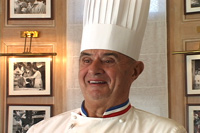
Making Kings Of Pastry People often ask why we would make a film about a French pastry competition –especially after making films on Dylan (Don’t Look Back) and politics (The War Room). But as soon as we met chef Jacquy Pfeiffer it became clear that the Meilleurs Ouvriers de France competition was not going to be your average Top Chef cook off. These reality TV shows seemed like mere wind sprints compared to the marathon three-day M.O.F. contest which Jacquy was preparing to enter. But winning is not all that this epic contest represents. Becoming a M.O.F. (Best Craftsman in France) is a lifelong dream for French artisans that can only come true by seeking excellence. As Jacquy would say, “The M.O.F is not about doing the ‘best that you can do’ but the ‘best that can be done.” This degree of perfection in the pastry profession, like most Olympic contests, is achieved through passion, sacrifice, and extraordinary skill — and as we found out, for Jacquy and the other fifteen finalists, a lot of luck. … Continue reading →

Making Kings Of Pastry
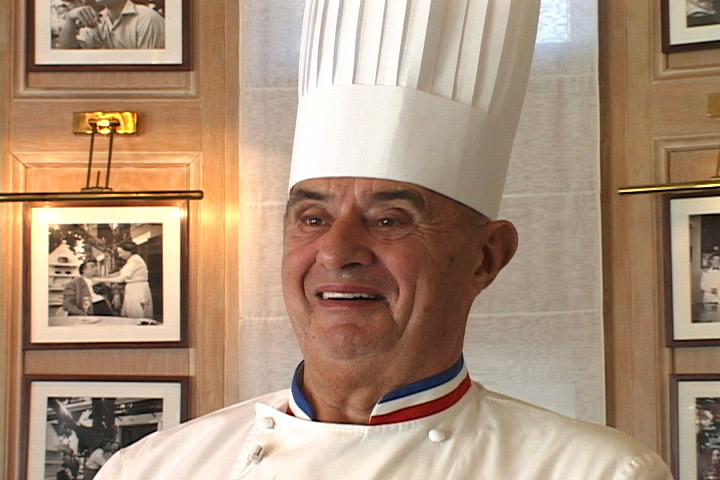
People often ask why we would make a film about a French pastry competition –especially after making films on Dylan (Don’t Look Back) and politics (The War Room). But as soon as we met chef Jacquy Pfeiffer it became clear that the Meilleurs Ouvriers de France competition was not going to be your average Top Chef cook off. These reality TV shows seemed like mere wind sprints compared to the marathon three-day M.O.F. contest which Jacquy was preparing to enter. But winning is not all that this epic contest represents. Becoming a M.O.F. (Best Craftsman in France) is a lifelong dream for French artisans that can only come true by seeking excellence. As Jacquy would say, “The M.O.F is not about doing the ‘best that you can do’ but the ‘best that can be done.” This degree of perfection in the pastry profession, like most Olympic contests, is achieved through passion, sacrifice, and extraordinary skill — and as we found out, for Jacquy and the other fifteen finalists, a lot of luck.
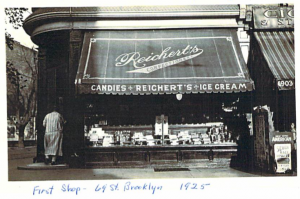 For me, (Chris Hegedus) the subject of Kings of Pastry was a natural fit. Like most of the chefs in the film, my grandfather apprenticed at sixteen to a baker in Europe. He immigrated to New York City, and in the 1920’s he opened two, elegant, confectionary ‘tea rooms’ creating his own signature chocolates and ice creams. My great-grandfather was chef for one of New York City’s most famous German restaurants and cooked for the Roosevelt family during the summer at their home on Campobello Island. On the other side of the family was my Hungarian grandmother, well known in her community for her exquisite cooking and baking. When other kids in the 1950s were eating Betty Crocker birthday cakes mixed from a box I would get a ten-layer “Dobos Torte” sponge cake with a caramel filling, mocha butter cream icing and a burnt-sugar glaze. Every year we would count how many layers Grammy would make for the cake. She lived until she was 94 so I felt blessed!
For me, (Chris Hegedus) the subject of Kings of Pastry was a natural fit. Like most of the chefs in the film, my grandfather apprenticed at sixteen to a baker in Europe. He immigrated to New York City, and in the 1920’s he opened two, elegant, confectionary ‘tea rooms’ creating his own signature chocolates and ice creams. My great-grandfather was chef for one of New York City’s most famous German restaurants and cooked for the Roosevelt family during the summer at their home on Campobello Island. On the other side of the family was my Hungarian grandmother, well known in her community for her exquisite cooking and baking. When other kids in the 1950s were eating Betty Crocker birthday cakes mixed from a box I would get a ten-layer “Dobos Torte” sponge cake with a caramel filling, mocha butter cream icing and a burnt-sugar glaze. Every year we would count how many layers Grammy would make for the cake. She lived until she was 94 so I felt blessed!
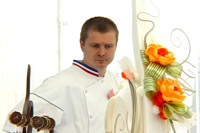 So when we were looking for our next project Kings of Pastry seemed zen. We heard about the Meilleurs Ouvriers de France competition when our friend, Flora Lazar, decided to jettison a prestigious career in public service and enter Chicago’s highly regarded French Pastry School to pursue her dream of becoming a French pastry chef. After graduating, Flora told us that her teacher, chef Jacquy Pfeiffer, an award-winning French chef from Alsace and one of the founders of the school, was competing in the legendary M.O.F. competition. Flora thought it would make an interesting story for an article. We thought would make a terrific documentary. It had all of the personal drama that we look for in our films. Like The War Room, it was a buddy story: Jacquy’s coach for the competition was Sebastien Canonne, who had started the school with him. Sebastien won the competition several years earlier and wore on his chef jacket the coveted blue, white and red collar that told the world he was a M.O.F — a member of France’s culinary elite. So the stakes were high for Jacquy, both personally and professionally.
So when we were looking for our next project Kings of Pastry seemed zen. We heard about the Meilleurs Ouvriers de France competition when our friend, Flora Lazar, decided to jettison a prestigious career in public service and enter Chicago’s highly regarded French Pastry School to pursue her dream of becoming a French pastry chef. After graduating, Flora told us that her teacher, chef Jacquy Pfeiffer, an award-winning French chef from Alsace and one of the founders of the school, was competing in the legendary M.O.F. competition. Flora thought it would make an interesting story for an article. We thought would make a terrific documentary. It had all of the personal drama that we look for in our films. Like The War Room, it was a buddy story: Jacquy’s coach for the competition was Sebastien Canonne, who had started the school with him. Sebastien won the competition several years earlier and wore on his chef jacket the coveted blue, white and red collar that told the world he was a M.O.F — a member of France’s culinary elite. So the stakes were high for Jacquy, both personally and professionally.
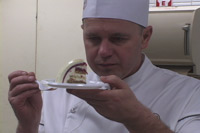 We started filming Jacquy at the French Pastry School in Chicago where he was preparing for the competition. Each M.O. F. competition has a different theme — this year’s was marriage — and Jacquy was hard at work designing a complex raspberry caramel, vanilla mousse, hazelnut wedding cake, shaped like a half dome, that he hoped would impress the judges with its originality. Every competing chef would have to design and construct a complete buffet presentation suitable for a wedding, using only edible materials to make fragile sugar sculptures that would tower elegantly above the cakes and pastries. Jacquy figured his buffet might require as many as forty different recipes.
We started filming Jacquy at the French Pastry School in Chicago where he was preparing for the competition. Each M.O. F. competition has a different theme — this year’s was marriage — and Jacquy was hard at work designing a complex raspberry caramel, vanilla mousse, hazelnut wedding cake, shaped like a half dome, that he hoped would impress the judges with its originality. Every competing chef would have to design and construct a complete buffet presentation suitable for a wedding, using only edible materials to make fragile sugar sculptures that would tower elegantly above the cakes and pastries. Jacquy figured his buffet might require as many as forty different recipes.
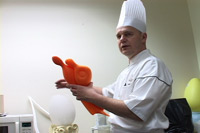 Watching Jacquy work a huge ball of sugar and blow it into a Brancusi figurine like an expert glass artist, it became clear that there was more required for this contest than imaginative baking. We decided then that we wanted to follow Jacquy back to his childhood home in Alsace, France where he would continue to practice for the competition. Raw materials for baking, flour, butter, sugar, would all be different in France and he would have to master that difference before the contest. We convinced Flora, who spoke French to be our field producer. Frazer Pennebaker, our longtime partner, would executive and co-produce the project from
Watching Jacquy work a huge ball of sugar and blow it into a Brancusi figurine like an expert glass artist, it became clear that there was more required for this contest than imaginative baking. We decided then that we wanted to follow Jacquy back to his childhood home in Alsace, France where he would continue to practice for the competition. Raw materials for baking, flour, butter, sugar, would all be different in France and he would have to master that difference before the contest. We convinced Flora, who spoke French to be our field producer. Frazer Pennebaker, our longtime partner, would executive and co-produce the project from
New York.
Filming the competition in Lyon would require the blessing of the Meilleurs Ouvriers de France organization. Unfortunately it was August and nearly everyone in France goes on vacation and we could not get in touch with anyone from the M.O.F. organization. We decided to take a gamble and go ahead with the film anyway. Real life stories rarely wait for financing and approval and since Chris was doing most of the filming, it was not a huge investment.
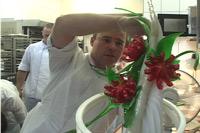 In France we also filmed French chefs Regis Lazard and Philippe Rigollot, two other finalists preparing for the competition. Regis worked at a patisserie in nearby Luxembourg and was being coached by the pastry chef for French President Nicolas Sarkozy. This was the second time Regis competed for the M.O.F. The first time he lost his balance climbing the stairs leading to the buffet area and dropped his sugar sculpture. The memory of this disaster still haunted Regis as he prepared to try once more for the prized collar. For all the finalists, the strain of the contest, both financially and personally, was enormous. Regis’ wife explained to us, “When we built this house, before building the bedrooms and kitchen, we built this special kitchen in the basement for him to practice for the M.O.F. It was his dream so I let him do it again, but if he doesn’t get it this time, that’s it.”
In France we also filmed French chefs Regis Lazard and Philippe Rigollot, two other finalists preparing for the competition. Regis worked at a patisserie in nearby Luxembourg and was being coached by the pastry chef for French President Nicolas Sarkozy. This was the second time Regis competed for the M.O.F. The first time he lost his balance climbing the stairs leading to the buffet area and dropped his sugar sculpture. The memory of this disaster still haunted Regis as he prepared to try once more for the prized collar. For all the finalists, the strain of the contest, both financially and personally, was enormous. Regis’ wife explained to us, “When we built this house, before building the bedrooms and kitchen, we built this special kitchen in the basement for him to practice for the M.O.F. It was his dream so I let him do it again, but if he doesn’t get it this time, that’s it.”
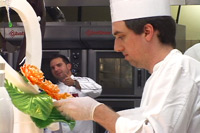 Philippe Rigollot is the pastry chef at the renowned restaurant, Maison Pic, in Valence. It’s the only three-star restaurant in France owned by a woman. Growing up in the bakery where his mother worked, it had been Philippe’s lifelong dream to wear the tri-color collar of the M.O.F. chefs. His wife, a chocolatier, also works at Maison Pic. She helped her husband prepare for the competition along with two other coaches, each highly regarded M.O.F’s.
Philippe Rigollot is the pastry chef at the renowned restaurant, Maison Pic, in Valence. It’s the only three-star restaurant in France owned by a woman. Growing up in the bakery where his mother worked, it had been Philippe’s lifelong dream to wear the tri-color collar of the M.O.F. chefs. His wife, a chocolatier, also works at Maison Pic. She helped her husband prepare for the competition along with two other coaches, each highly regarded M.O.F’s.
In Lyon, long time collaborator, Nick Doob, joined us as a third camera because the sixteen chefs would be cooking in three separate kitchens. Finally, just days before the competition began we met with the head of the M.O.F. pastry competition, Chef Philippe Urraca, and some of the M.O.F judges. Flora very skillfully secured the permission to film the competition (assisted by two of our French-speaking friends, Patty Soussloff and Susan Buckley, who had joined us in Lyon to view the final buffet presentations). We were the first persons ever allow to witness the M.O.F. pastry competition. Chef Urraca was seriously concerned that we not interfere in any way. Everyone was worried that one of our cameras would accidentally bump a fragile sugar sculpture. By the third day, we were restricted to shooting from a 3-foot square box that they drew on the floor at the end of each table.
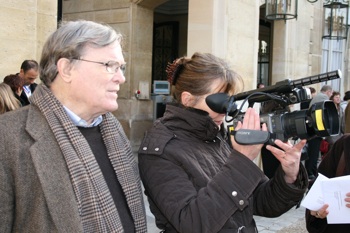 During our adventure with Flora both in France and at the French Pastry School, we filmed some amazing people and events that never made it into our final cut. I know that they will make it on to the DVD but we would also like to share some outtakes with you.
During our adventure with Flora both in France and at the French Pastry School, we filmed some amazing people and events that never made it into our final cut. I know that they will make it on to the DVD but we would also like to share some outtakes with you.




 For me, (Chris Hegedus) the subject of Kings of Pastry was a natural fit. Like most of the chefs in the film, my grandfather apprenticed at sixteen to a baker in Europe. He immigrated to New York City, and in the 1920’s he opened two, elegant, confectionary ‘tea rooms’ creating his own signature chocolates and ice creams. My great-grandfather was chef for one of New York City’s most famous German restaurants and cooked for the Roosevelt family during the summer at their home on Campobello Island. On the other side of the family was my Hungarian grandmother, well known in her community for her exquisite cooking and baking. When other kids in the 1950s were eating Betty Crocker birthday cakes mixed from a box I would get a ten-layer “Dobos Torte” sponge cake with a caramel filling, mocha butter cream icing and a burnt-sugar glaze. Every year we would count how many layers Grammy would make for the cake. She lived until she was 94 so I felt blessed!
For me, (Chris Hegedus) the subject of Kings of Pastry was a natural fit. Like most of the chefs in the film, my grandfather apprenticed at sixteen to a baker in Europe. He immigrated to New York City, and in the 1920’s he opened two, elegant, confectionary ‘tea rooms’ creating his own signature chocolates and ice creams. My great-grandfather was chef for one of New York City’s most famous German restaurants and cooked for the Roosevelt family during the summer at their home on Campobello Island. On the other side of the family was my Hungarian grandmother, well known in her community for her exquisite cooking and baking. When other kids in the 1950s were eating Betty Crocker birthday cakes mixed from a box I would get a ten-layer “Dobos Torte” sponge cake with a caramel filling, mocha butter cream icing and a burnt-sugar glaze. Every year we would count how many layers Grammy would make for the cake. She lived until she was 94 so I felt blessed! So when we were looking for our next project Kings of Pastry seemed zen. We heard about the Meilleurs Ouvriers de France competition when our friend, Flora Lazar, decided to jettison a prestigious career in public service and enter Chicago’s highly regarded French Pastry School to pursue her dream of becoming a French pastry chef. After graduating, Flora told us that her teacher, chef Jacquy Pfeiffer, an award-winning French chef from Alsace and one of the founders of the school, was competing in the legendary M.O.F. competition. Flora thought it would make an interesting story for an article. We thought would make a terrific documentary. It had all of the personal drama that we look for in our films. Like The War Room, it was a buddy story: Jacquy’s coach for the competition was Sebastien Canonne, who had started the school with him. Sebastien won the competition several years earlier and wore on his chef jacket the coveted blue, white and red collar that told the world he was a M.O.F — a member of France’s culinary elite. So the stakes were high for Jacquy, both personally and professionally.
So when we were looking for our next project Kings of Pastry seemed zen. We heard about the Meilleurs Ouvriers de France competition when our friend, Flora Lazar, decided to jettison a prestigious career in public service and enter Chicago’s highly regarded French Pastry School to pursue her dream of becoming a French pastry chef. After graduating, Flora told us that her teacher, chef Jacquy Pfeiffer, an award-winning French chef from Alsace and one of the founders of the school, was competing in the legendary M.O.F. competition. Flora thought it would make an interesting story for an article. We thought would make a terrific documentary. It had all of the personal drama that we look for in our films. Like The War Room, it was a buddy story: Jacquy’s coach for the competition was Sebastien Canonne, who had started the school with him. Sebastien won the competition several years earlier and wore on his chef jacket the coveted blue, white and red collar that told the world he was a M.O.F — a member of France’s culinary elite. So the stakes were high for Jacquy, both personally and professionally. We started filming Jacquy at the French Pastry School in Chicago where he was preparing for the competition. Each M.O. F. competition has a different theme — this year’s was marriage — and Jacquy was hard at work designing a complex raspberry caramel, vanilla mousse, hazelnut wedding cake, shaped like a half dome, that he hoped would impress the judges with its originality. Every competing chef would have to design and construct a complete buffet presentation suitable for a wedding, using only edible materials to make fragile sugar sculptures that would tower elegantly above the cakes and pastries. Jacquy figured his buffet might require as many as forty different recipes.
We started filming Jacquy at the French Pastry School in Chicago where he was preparing for the competition. Each M.O. F. competition has a different theme — this year’s was marriage — and Jacquy was hard at work designing a complex raspberry caramel, vanilla mousse, hazelnut wedding cake, shaped like a half dome, that he hoped would impress the judges with its originality. Every competing chef would have to design and construct a complete buffet presentation suitable for a wedding, using only edible materials to make fragile sugar sculptures that would tower elegantly above the cakes and pastries. Jacquy figured his buffet might require as many as forty different recipes. Watching Jacquy work a huge ball of sugar and blow it into a Brancusi figurine like an expert glass artist, it became clear that there was more required for this contest than imaginative baking. We decided then that we wanted to follow Jacquy back to his childhood home in Alsace, France where he would continue to practice for the competition. Raw materials for baking, flour, butter, sugar, would all be different in France and he would have to master that difference before the contest. We convinced Flora, who spoke French to be our field producer. Frazer Pennebaker, our longtime partner, would executive and co-produce the project from
Watching Jacquy work a huge ball of sugar and blow it into a Brancusi figurine like an expert glass artist, it became clear that there was more required for this contest than imaginative baking. We decided then that we wanted to follow Jacquy back to his childhood home in Alsace, France where he would continue to practice for the competition. Raw materials for baking, flour, butter, sugar, would all be different in France and he would have to master that difference before the contest. We convinced Flora, who spoke French to be our field producer. Frazer Pennebaker, our longtime partner, would executive and co-produce the project from In France we also filmed French chefs Regis Lazard and Philippe Rigollot, two other finalists preparing for the competition. Regis worked at a patisserie in nearby Luxembourg and was being coached by the pastry chef for French President Nicolas Sarkozy. This was the second time Regis competed for the M.O.F. The first time he lost his balance climbing the stairs leading to the buffet area and dropped his sugar sculpture. The memory of this disaster still haunted Regis as he prepared to try once more for the prized collar. For all the finalists, the strain of the contest, both financially and personally, was enormous. Regis’ wife explained to us, “When we built this house, before building the bedrooms and kitchen, we built this special kitchen in the basement for him to practice for the M.O.F. It was his dream so I let him do it again, but if he doesn’t get it this time, that’s it.”
In France we also filmed French chefs Regis Lazard and Philippe Rigollot, two other finalists preparing for the competition. Regis worked at a patisserie in nearby Luxembourg and was being coached by the pastry chef for French President Nicolas Sarkozy. This was the second time Regis competed for the M.O.F. The first time he lost his balance climbing the stairs leading to the buffet area and dropped his sugar sculpture. The memory of this disaster still haunted Regis as he prepared to try once more for the prized collar. For all the finalists, the strain of the contest, both financially and personally, was enormous. Regis’ wife explained to us, “When we built this house, before building the bedrooms and kitchen, we built this special kitchen in the basement for him to practice for the M.O.F. It was his dream so I let him do it again, but if he doesn’t get it this time, that’s it.” Philippe Rigollot is the pastry chef at the renowned restaurant, Maison Pic, in Valence. It’s the only three-star restaurant in France owned by a woman. Growing up in the bakery where his mother worked, it had been Philippe’s lifelong dream to wear the tri-color collar of the M.O.F. chefs. His wife, a chocolatier, also works at Maison Pic. She helped her husband prepare for the competition along with two other coaches, each highly regarded M.O.F’s.
Philippe Rigollot is the pastry chef at the renowned restaurant, Maison Pic, in Valence. It’s the only three-star restaurant in France owned by a woman. Growing up in the bakery where his mother worked, it had been Philippe’s lifelong dream to wear the tri-color collar of the M.O.F. chefs. His wife, a chocolatier, also works at Maison Pic. She helped her husband prepare for the competition along with two other coaches, each highly regarded M.O.F’s. During our adventure with Flora both in France and at the French Pastry School, we filmed some amazing people and events that never made it into our final cut. I know that they will make it on to the DVD but we would also like to share some outtakes with you.
During our adventure with Flora both in France and at the French Pastry School, we filmed some amazing people and events that never made it into our final cut. I know that they will make it on to the DVD but we would also like to share some outtakes with you.